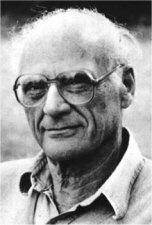In Remembrance: Arthur Miller
 Arthur
Miller, one of the best-known American playwrights, who penned
Death of a Salesman and The Crucible, passed away
Thursday night February 10, 2005 in Roxbury, Connecticut. He
was 89.
Arthur
Miller, one of the best-known American playwrights, who penned
Death of a Salesman and The Crucible, passed away
Thursday night February 10, 2005 in Roxbury, Connecticut. He
was 89.
Born October 17, 1915 in Manhattan, NY, Miller was one of three children in a middle-class Jewish family. The family had moved to Brooklyn by 1928, after the Depression had taken its toll on the familyís garment business. Miller spent much of his free time playing football or reading wild adventure stories. After finishing high school, Miller took up odd jobs to save up for college. In 1934 he enrolled at the University of Michigan, eager to become a writer. Most of his four years were spent learning to write and working on a number of well-received plays.
After graduating in 1938, Miller returned to New York. He found work with the Federal Theatre Project, writing various scripts for well-known radio programs, such as Columbia Workshop (CBS) and Cavalcade of America (NBC). In 1944, his first play, The Man Who Had All the Luck, opened to horrible review and closed after four shows. However, the failure didnít stop Miller from writing. Three years later, he had his first play on Broadway. Success finally came with All My Sons, a tragedy about a manufacturer who sells faulty parts to the military in order to save his business. The play would later win the coveted Drama Critics' Circle award. All My Sons (1948) appeared on the big screen a year later, with Edward G. Robinson and Burt Lancaster filling the lead roles.
Miller was 33 when he wrote the Drama Critics Circle Award and the Pulitzer Prize winning Death of a Salesman, one of the most quintessential plays of the 20th century, in a short time of just six weeks. It opened on Broadway in February 1949, directed by Elia Kazan, earning rave reviews. Death of a Salesman focused on a failed businessman, Willy Loman, as he tries to remember and reconstruct his life, searching within himself for his own self-worth. The play has been provided many onscreen interpretations - Fredric March starred as Willy Loman in 1951ís Death of a Salesman, and renowned actors Dustin Hoffman and John Malkovich appeared in a masterful 1985 made-for-television film.
While America was engulfed in the escalating fears of Communism and prejudice, Miller was hard at work on another play. Clearly a mockery of the exploitive political environment of McCarthyism, The Crucible earned a Tony Award in 1953 for its bleak yet harrowing portrait of the mass hysteria surrounding the Salem Witch trials. Miller wrote the screenplay for the 1996 Hollywood version of The Crucible which starred his son-in-law Daniel Day Lewis and Winona Ryder.
In 1956 Miller was called before the House Committee on Un-American Activities. Miller admitted that he had attended certain meetings, but denied that he was a Communist. Miller also earned unwanted publicity the same year by marrying motion-picture actress Marilyn Monroe. The marriage was turbulent from day one and Miller wrote next to nothing in the next four years, except for uncredited work on the screenplay for the George Cukor directed Lets Make Love (1960, starring wife Monroe) and the screenplay for The Misfits. The movie was directed 1961 by John Huston, an engrossing fable of love and drama that served as the last film of Clark Gable and Monroe. Across the Atlantic, director Sidney Lumet brought Millerís 1955 play A View from the Bridge to the screen as Vu du pont (1961) starring Raf Vallone and Maureen Stapleton.
Monroe was found dead in 1962 from an apparent drug overdose. It was reported that Monroe was constantly late arriving on set for The Misfits and she was heavily addicted to drugs, causing the marriage to Miller to ultimately fall apart. Miller later married photographer Inge Morath.
Millerís work would sporadically appear in Hollywood, such as the little-seen An Enemy of the People (1978), an adaptation of Ibsen's play starring Steve McQueen and Everybody Wins (1989). Eden (a flat romantic drama starring Samantha Morton) and Focus (starring William H Macy and Laura Dern), screen versions of his acclaimed novels, were both released in 2001.
Actor Michael Douglas has agreed to star in The Ride Down Mount Morgan, based on Millerís 1991 play, set to be released in 2006. On January 28, 2005 it was announced that Scott Ellis would direct The Man Who Had All the Luck.
Of course Miller had success with his other works. He wrote Incident at Vichy (1964), The Archbishopís Ceiling (1977), Timebends: A Life (1987) Ė his autobiography, and The Last Yankee (1990). In 1991 he opened his play, The Ride Down Mt. Morgan, in London - the first time he had opened a play outside of the United States. He returned to Broadway in 1994 with Broken Glass, a drama about a dysfunctional family that won respectful reviews and a Tony nomination. Last October, another new play, Finishing the Picture, based on an episode of his marriage to Monroe, premiered at the Goodman Theatre in Chicago.
Whether exposing the crassness of McCarthyism or the inner frailties of the Everyman persona, Miller had his pen on the pulse of modern consciousness. No American playwright, other than Tennessee Williams, has captured the depth and character of American society so much as Miller.
-John L. Gibbon